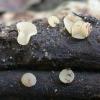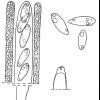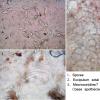
27-02-2026 17:51
 Michel Hairaud
Michel Hairaud
Bonjour, Quelqu'un peut il me donner un conseil p

28-02-2026 14:43
A new refrence desired :Svanidze, T.V. (1984) Novy

29-11-2024 21:47
Yanick BOULANGERBonjourJ'avais un deuxième échantillon moins mat

27-02-2026 16:17
 Mathias Hass
Mathias Hass
Hi, Found this on Betula, rather fresh fallen twi

27-02-2026 12:56
Åge OterhalsFound on fallen cones of Pinus sylvestris in midle

27-02-2026 11:21
 Yannick Mourgues
Yannick Mourgues
Hi to all. Here is a specie that can may be relat
Pezoloma (or Hymenoscyphus) kathiae : confirmation
Nicolas VAN VOOREN,
29-07-2009 23:04
 Bonsoir.
Bonsoir.Je pense avoir récolté Pezoloma kathiae Korf. Voici la photo macro, les éléments micros suivent.
Merci de me confirmer pour ceux qui connaissent cette espèce.
Nicolas VAN VOOREN,
29-07-2009 23:08

Re:Pezoloma (or Hymenoscyphus) kathiae : confirmation
Micro :
Asques 100-115 x 8-9 µm, avec crochet, anneau apical IKI+ (bb). Paraphyses contenant de très nombreuses vacuoles réfringentes. Spores 10-14 x 4-4.5 (5) µm, avec de gros LBs et d'autres plus fins. Excipulum médullaire de textura porrecta ; excipulum ectal de textura globulosa, à cellules Ø 9-28 µm. Léger bleuissement à la base de l'apothécie en présence d'IKI.
Asques 100-115 x 8-9 µm, avec crochet, anneau apical IKI+ (bb). Paraphyses contenant de très nombreuses vacuoles réfringentes. Spores 10-14 x 4-4.5 (5) µm, avec de gros LBs et d'autres plus fins. Excipulum médullaire de textura porrecta ; excipulum ectal de textura globulosa, à cellules Ø 9-28 µm. Léger bleuissement à la base de l'apothécie en présence d'IKI.
Nicolas VAN VOOREN,
29-07-2009 23:15

Re:Pezoloma (or Hymenoscyphus) kathiae : confirmation
Voici un petit montage photo, avec notamment la présence de macroconidies (je pense) à la base de l'apothécie. Je ne sais si elles sont liés à l'anamorphe de ce champignon ou à un autre, car les apothécies poussaient sur un fragment de petite branche (feuillu) dans une zone humide, fangeuse.
Lieu de récolte : bois de la Flachère, Le Bois-d'Oingt (Rhône, France), alt. 300 m, N 45°54'37" - E 4°33'57", le 25-VII-2009.
Lieu de récolte : bois de la Flachère, Le Bois-d'Oingt (Rhône, France), alt. 300 m, N 45°54'37" - E 4°33'57", le 25-VII-2009.
Hans-Otto Baral,
29-07-2009 23:23

Re:Pezoloma (or Hymenoscyphus) kathiae : confirmation
Hi Nicolas
yes, I think this is kathiae. The conidia might belong here because Descals or Webster described similar conidia in a fungus looking like H. imberbis. Did you measure the conidia?
Zotto
yes, I think this is kathiae. The conidia might belong here because Descals or Webster described similar conidia in a fungus looking like H. imberbis. Did you measure the conidia?
Zotto
Nicolas VAN VOOREN,
29-07-2009 23:37

Re:Pezoloma (or Hymenoscyphus) kathiae : confirmation
Hi Zotto.
Yes, they can reach up to 230 µm long and 7-8 µm wide.
Yes, they can reach up to 230 µm long and 7-8 µm wide.
Richard Korf,
29-07-2009 23:48
Re:Pezoloma (or Hymenoscyphus) kathiae : confirmation
Certainly very like Pezoloma kathiae, but the paraphyses you draw are exceptionally broad, and I didn't see any contents such as those you illustrate. No conidia were observed by us in cultures. I don't know if Zotto has made any further exploration of these species nor whether he still believes they belong in Hymenoscyphus. Maybe there is some molecular data now?
Dick Korf
Dick Korf
Hans-Otto Baral,
30-07-2009 00:00

Re:Pezoloma (or Hymenoscyphus) kathiae : confirmation
Yes, we (Ricardo Galan) have molecular data on this group: the analysis was presented on the poster in 2002 by Collado et al. There, H. kathiae clusters with H. imberbis, H. vernus and Anguillospora furtiva in a distinct clade, with the next relatives Discinella terrestris and Tatraea dumbirensis. This clade is associated to the main part of Hymenoscyphus and Cyathicula.
I regret there is no Cudoniella in this tree because I think that the clade around H. imberbis/vernus could be placed in Cudoniella. There is also no Pezoloma in this tree.
Zotto
I regret there is no Cudoniella in this tree because I think that the clade around H. imberbis/vernus could be placed in Cudoniella. There is also no Pezoloma in this tree.
Zotto
Richard Korf,
30-07-2009 01:38
Re:Pezoloma (or Hymenoscyphus) kathiae : confirmation
Thanks, Zotto. I suspect from what you say that these are far enough from Hymenoscyphus that you would not want to keep them there. No combination in Hymenoscyphus appears to have been made for P. kathiae. Not sure if any other Pezoloma spp. were treated in that study. I can't help wondering about those paraphyses.
Dick
Dick
Hans-Otto Baral,
30-07-2009 09:31

Re:Pezoloma (or Hymenoscyphus) kathiae : confirmation
Dear Dick
I did not find any taxon under the name Pezoloma in this tree, but maybe there are some under another combination. P. kathiae was actually transferred to Hymenoscyphus by me: in Dimitrova & Baral 2005, Fl. Medit. 15, Checklist of Bulgarian Discomycetes. At that tiem I favoured a broad concept of the genus. On the other hand, H. imberbis was never transferred to Pezoloma, although it is hardly different except for a much lower amount of oil in the spores. Yet, I think that Pezoloma iodopedis is a synonym of H. imberbis.
About the paraphyses I forgot to write the following. Do you remember: when you published P. kathiae I compared this species with my previously unidentified collections which I considered to be conspecific. But in your drawing the paraphyses were without guttules. Since you obviously studied the specimen in the dead rehydrated state, I did not see any problems to take my collections with multiguttulate paraphyses as conspecific. The type of Pezoloma is, however, without any such guttules, even in the living state. These guttules (VBs) are a very striking feature of the living fungus. They disappear in KOH or when dried, and stain turquoise under vital staining with cresyl blue.
So I asked you about this vital character maybe 8 years ago, and I remember you went at the type locality and recollected material, and you actually found the strikingly guttulate paraphyses because now you studied the fungus directly when still fresh.
Zotto
I did not find any taxon under the name Pezoloma in this tree, but maybe there are some under another combination. P. kathiae was actually transferred to Hymenoscyphus by me: in Dimitrova & Baral 2005, Fl. Medit. 15, Checklist of Bulgarian Discomycetes. At that tiem I favoured a broad concept of the genus. On the other hand, H. imberbis was never transferred to Pezoloma, although it is hardly different except for a much lower amount of oil in the spores. Yet, I think that Pezoloma iodopedis is a synonym of H. imberbis.
About the paraphyses I forgot to write the following. Do you remember: when you published P. kathiae I compared this species with my previously unidentified collections which I considered to be conspecific. But in your drawing the paraphyses were without guttules. Since you obviously studied the specimen in the dead rehydrated state, I did not see any problems to take my collections with multiguttulate paraphyses as conspecific. The type of Pezoloma is, however, without any such guttules, even in the living state. These guttules (VBs) are a very striking feature of the living fungus. They disappear in KOH or when dried, and stain turquoise under vital staining with cresyl blue.
So I asked you about this vital character maybe 8 years ago, and I remember you went at the type locality and recollected material, and you actually found the strikingly guttulate paraphyses because now you studied the fungus directly when still fresh.
Zotto
Nicolas VAN VOOREN,
30-07-2009 13:19

Re:Pezoloma (or Hymenoscyphus) kathiae : confirmation
Thanks for all these data.
Zotto, do you have an offprint of your paper published with Dimitrova? If so, I'm interested by this article.
Zotto, do you have an offprint of your paper published with Dimitrova? If so, I'm interested by this article.
Richard Korf,
30-07-2009 14:38
Re:Pezoloma (or Hymenoscyphus) kathiae : confirmation
Hi, Zotto,
I forgot all that! Your combination was not picked up by Index Fungorum. Please contact Paul Kirk <p.kirk@cabi.org> and give him the full citation.
Dick
I forgot all that! Your combination was not picked up by Index Fungorum. Please contact Paul Kirk <p.kirk@cabi.org> and give him the full citation.
Dick


